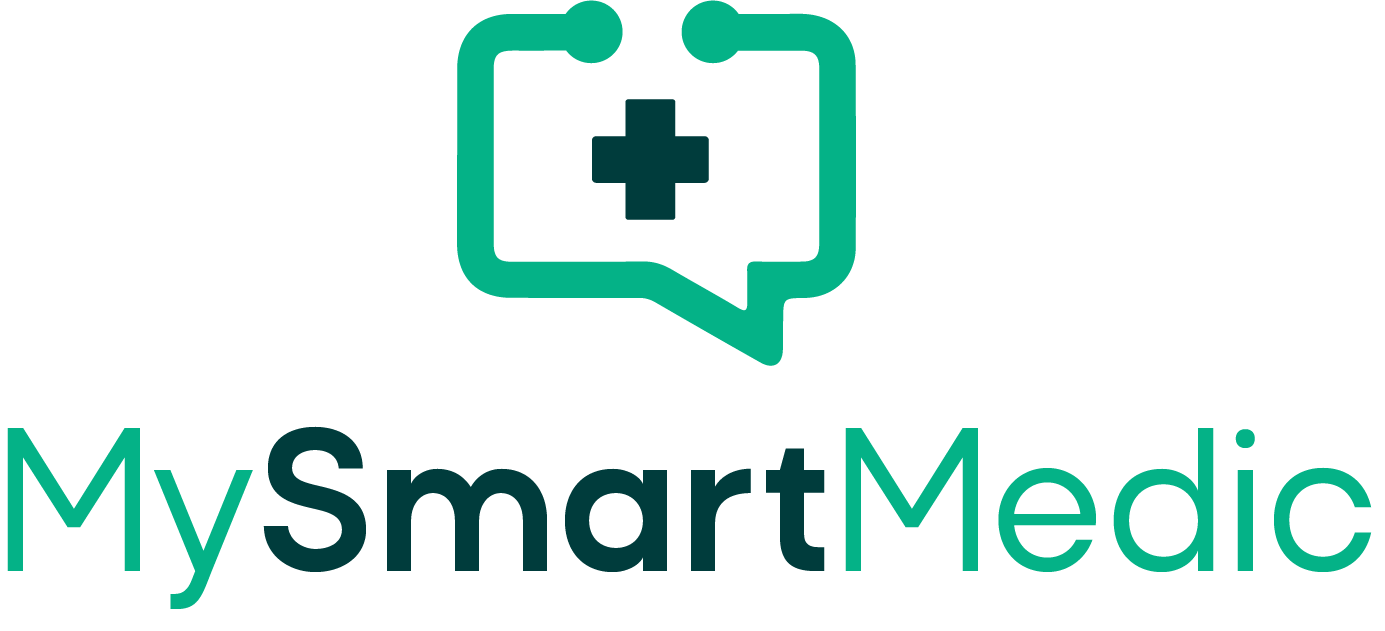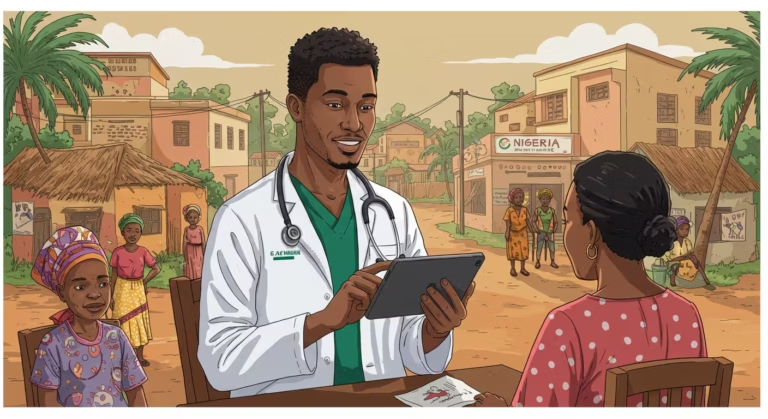Top 10 Telemedicine Use Cases in Nigeria
These days, you don’t need to be in a big city like Abuja or Lagos before you see a doctor. Whether you are staying in your family compound in Benue or managing your small business in Enugu, medical help can reach you right where you are. That is what telemedicine is doing for Nigerians now.
Let’s be honest. Going to the hospital is not always easy. Traffic, long queues, transport money, or even fear of hospital bills can cause many people to delay treatment.
But now, some Nigerians are already making video calls with doctors, getting test results by phone, and even collecting prescriptions without stepping out of their homes.
So what exactly are we talking about? This article will break down real-life ways people in Nigeria are using telemedicine. Not theory. Actual examples.
We will also answer some questions people ask often, such as: Is this thing safe? Are the doctors real? What if I don’t have Wi-Fi?
One platform doing this well is MySmartMedic. We have made it easier to reach licensed Nigerian doctors, whether it is for regular checkups or something urgent. You can even chat in your language if English is not your strongest.
Let’s look at what telemedicine really means and how it is already changing lives in this country.
What Is Telemedicine?
In simple terms, telemedicine just means getting medical care via the internet without going to the hospital.
Instead of sitting in front of a doctor at the clinic, you talk to them using your phone, sometimes by video, voice call, and in some cases, just by chatting.
For example, let’s say you are feeling feverish in the evening and you are not sure if it is malaria or just stress.
Instead of waiting till morning or rushing to the chemist, you can speak to a licensed doctor online who will ask you questions, suggest tests if needed, and tell you what to do next. That is telemedicine.
It started becoming more common during the COVID period when many people could not go to the hospital freely. But now, even after the lockdowns have ended, it is still growing fast across Nigeria.
It is especially helpful for people who live far from big hospitals or those who cannot take time off work just to see a doctor.
Reputable platforms like MySmartMedic are even taking it a step further by offering chat-based follow-ups, remote monitoring for people with chronic illnesses, and audio consultations that do not require a strong internet connection.
So, instead of waiting in line at the hospital, you can now talk to a doctor right from your room, your shop, or even your farm, depending on what works best for you.
Top 10 Telemedicine Use Cases in Nigeria
These days, telemedicine is solving small and big health issues for Nigerians in ways that were almost unthinkable some years ago.
Whether you are living in a busy part of Lagos or a quieter town like Gboko, access to doctors online is now becoming normal.
Let’s look at ten practical telemedicine use cases that many people are already taking advantage of, especially in a country where seeing a doctor physically is not always easy or affordable.
1. General Primary Care
You know those regular illnesses such as malaria, fever, sore throat, skin reactions, or even small cuts.
Instead of rushing to the clinic, many people are now picking up their phones first. They talk to a doctor through video or voice call and explain their symptoms.
The doctor then gives advice or treatment options. If medication is needed, the prescription is sent digitally.
This is one of the most common telemedicine examples in Nigeria, especially in homes where people are already used to doing things with their phones.
2. Chronic Disease Management
People living with high blood pressure, diabetes, or asthma need constant monitoring. But not every check-up has to be physical.
With telemedicine, they can have regular follow-up sessions from home. They share their readings, talk about how they feel, and the doctor advises on any changes.
It saves time and reduces transport stress, especially for older patients. MySmartMedic even reminds patients when to take their drugs or do basic tests.
3. Mental Health Support
Mental health is still hard to talk about in many parts of Nigeria. A lot of people are afraid of being judged or misunderstood. But with telemedicine, it is easier now to book a private session with a therapist or counselor, no questions, no shame.
Nigerians are using online therapy to deal with stress, anxiety, depression, and even burnout from work.
There are NGOs and platforms working in this space too, like Mentally Aware Nigeria Initiative, and they have been helping more young people speak up and get help.
4. Pediatric Consultations
Nobody wants to carry a sick baby from one hospital to another if it is not necessary. With telemedicine, mothers and fathers can talk to pediatricians from their homes.
Things like skin rashes, child fever, cough, nutrition issues most of these can be handled online first. And if it is something serious, the doctor will immediately say so and refer to an appropriate clinic. This reduces panic and unnecessary exposure for the child.
5. Women’s Health and Reproductive Care
A lot of women struggle with menstrual problems, UTIs, or pregnancy concerns, but they do not always feel comfortable going to the hospital, especially if the issue feels private.
Now, they can speak to female doctors online, in a more relaxed way. Some women also use telemedicine for fertility support, birth control questions, or postnatal advice.
These are sensitive topics, and the privacy that comes with virtual consultations makes a big difference.
6. Follow-up After Hospital Discharge
Discharge from the hospital does not always mean you are fully okay. Many patients still need to check in with their doctor for some time. Maybe they just had surgery, or maybe they are on new medication that needs monitoring.
In the past, this would mean another trip to the hospital or clinic, even if the person is tired, old, or lives far away.
These days, with a telemedicine platform like MySmartMedic, patients can speak with the doctor again after being discharged.
They talk about how they feel, what new symptoms they are noticing, or any side effects from their drugs. The doctor can then adjust the treatment if needed or just give advice.
It also helps catch problems early before they get worse. For example, if an elderly man who had surgery starts to feel dizzy after taking his medication, a quick follow-up call might prevent another emergency.
7. Specialist Referrals
Sometimes, you don’t know what is really wrong but you just know something feels off. Maybe it is chest pain that keeps coming back or a skin rash that will not go away.
Normally, you would see a general doctor first before being referred to a specialist like a cardiologist or dermatologist.
With telemedicine, this process is faster and easier. You can book a quick consultation with a general practitioner on platforms like MySmartMedic, explain your symptoms, and get advice.
If the case needs specialist attention, the doctor can refer you right away and there will be no need to first sit in a hospital lobby or queue for hours just to be told to come back another day.
8. Medication Prescriptions and Refills
After seeing a doctor, the next step is usually getting medication. But sometimes, that part becomes a whole separate stress. Maybe the pharmacy is far away.
Maybe you are too tired to go out. Or maybe you are managing a long-term condition and just need a quick refill.
That is where telemedicine helps. With platforms like MySmartMedic, you can get a valid digital prescription after your consultation. Many pharmacies now accept these, so there is no need to carry a paper note.
In fact, some telemedicine platforms are even linked to pharmacy partners that can deliver your drugs straight to your doorstep.
This is especially helpful for people with chronic illnesses like high blood pressure or diabetes, and even for women who need regular contraceptive pills. No more missing your meds just because of distance or stress.
9. Remote Diagnostics and Lab Orders
Sometimes, what you need is not just a doctor’s advice but an actual test maybe a blood check, a chest scan, or something more detailed. But going to a hospital just to get that done can take up your whole day.
Now with MySmartMedic, you can speak to a doctor first, describe your symptoms, and if they feel a test is needed, they will send you a digital referral.
You take that to a lab near you, do the test, and later return online to review the results with the same doctor. No need to move from clinic to lab to clinic again.
Some services even go further. In places like Abuja and Port Harcourt, certain labs now offer home sample collection.
It is one of those telemedicine examples in Nigeria that is making life easier, especially for busy people and the elderly.
10. Rural and Underserved Area Access
Before telemedicine, many people in places like Makurdi or Jalingo would spend half a day or more, just to see a nurse or doctor. Now, they can open their phones and get help fast. No long bus ride. No extra fare.
Imagine a farmer in Ogoja whose leg swells up while weeding his farm. Instead of trekking to town, he uses MySmartMedic on his phone. Omeife AI even understands him when he speaks Pidgin or his local dialect.
The doctor listens, asks a few questions, and advises on first aid. If the case is serious, they tell him which clinic to visit next.
This is not anything fancy. It is a lifeline for people who once had no real way to reach a qualified health worker.
That is why rural and underserved area access stands out as one of the most important telemedicine use cases in Nigeria.
Common Questions About Telemedicine in Nigeria
Q1. Are online doctors in Nigeria real and qualified?
Of course. MySmartMedic only works with MDCN-registered practitioners. You are talking to real doctors, the same as those in teaching hospitals.
Q2. Is telemedicine safe for serious illnesses?
For everyday problems like malaria, cough, or adjusting drugs, yes. But if it is urgent such as breathing issues, heavy bleeding, or stroke signs, you will be referred to the hospital immediately.
Q3. Can I get a prescription or lab test from a virtual doctor?
Yes. After your session, you get an e-prescription. You can show it at any pharmacy. For tests, you can receive a referral letter on your phone. Some labs even come to your house in places like Lagos, Abuja and Port Harcourt.
Q4. What if I don’t have a strong internet connection?
No worries. MySmartMedic runs on low data. They offer audio calls and light chat. Even on 2G, you can still be attended to by a doctor.
Q5. Will my medical records be secure?
Yes. They follow NDPR rules. Everything is encrypted. Your data is treated like gold, kept safe, and no sharing without your permission.
How MySmartMedic Makes These Use Cases Possible
When people hear about telemedicine, it can sound like something only available abroad or for the rich. But platforms like MySmartMedic are changing that narrative by building something that truly works for Nigerians, both in cities and rural areas.
Let’s break down how they make all these telemedicine examples come to life.
AI-Powered Triage with Omeife
One of the first things that makes MySmartMedic stand out is its partnership with Omeife, a smart AI assistant that helps users explain symptoms in their local language.
Whether you speak Yoruba, Hausa, Igbo, or even Pidgin, Omeife understands and helps guide you through your health questions.
This is a big deal. It means that even if someone is not fluent in English or does not know the right medical terms, they can still get help. This type of inclusive design is rare and makes the app more useful for everyday Nigerians.
You can read more about Omeife AI on the Uniccon Group’s website, where it was first launched as Africa’s first humanoid robot.
Licensed Nigerian Doctors at Your Fingertips
MySmartMedic is not about chatting with a bot. The platform connects users to real doctors, all licensed by the Medical and Dental Council of Nigeria (MDCN).
Once you explain your symptoms, you are directed to a suitable healthcare provider based on your need whether it is a general consultation or a specialist referral.
These are the same doctors you would meet in a hospital, but without the long queues, hospital stress, or transportation costs.
Instant Prescriptions and Lab Orders
After your consultation, you can get a digital prescription instantly, which you can take to any nearby pharmacy. For lab tests, the doctor can send you a referral letter, and depending on your location, MySmartMedic may help schedule the test for you.
In bigger cities like Abuja and Lagos, they even partner with diagnostic labs for home sample collection, which makes things easier for people who are too sick or busy to go out.
A Mobile-Friendly and Data-Light Experience
The app was designed with Nigerians in mind. It runs smoothly on most Android phones, does not use up much data, and works even with slower networks. You do not need a laptop or super-fast Wi-Fi, just your smartphone and basic mobile data.
The interface is simple, so even if you are not tech-savvy, you can still book a consultation, view your prescription, or get health updates in a few clicks. It is this kind of practical thinking that has made MySmartMedic a reliable option for more people every day.
Conclusion on Telemedicine Use Cases in Nigeria and Africa
From regular coughs and follow-ups to more sensitive issues like mental health or women’s care, telemedicine is now a real option for Nigerians, not just a futuristic idea.
We have seen how platforms like MySmartMedic are bringing healthcare closer to people, whether you are in Ibadan, Gombe, or somewhere in between.
And this is not just about convenience. It is about saving lives, cutting stress, and making sure more people get the care they need, when they need it.
With Omeife helping with language barriers, licensed doctors ready to respond, and lab referrals now only a few taps away, virtual care is slowly becoming a part of everyday life.
The beauty is that it works for both young professionals in cities and families in rural communities. You do not even need to know much about tech to use it.
So, if you have been wondering whether to try it, this is your sign.
Ready to experience healthcare the smarter way?
Visit the MySmartMedic website or download the app on your phone. Book a virtual consultation today, it’s fast, secure, and easy.
